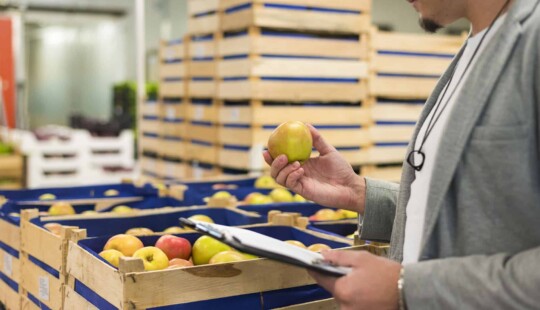“Hunger levels are at a new high,” according to United Nations Secretary-General António Guterres. In just the past two years, the number of severely food insecure people worldwide has doubled. Yet, he added, “there is enough food in our world now for everyone, if we act together.”
This collective action must take many forms. While the UN Security Council is discussing lifting export restrictions, financing, bolstering agricultural production, and investing in resilient food systems, business also has a role to play. The private sector’s role may be less immediate than that of governments and global councils, but it still has the potential for important long-term sustainability impacts. That role lies in reducing food waste and enabling circularity.
Currently, less than nine percent of our world is circular. If we transform our global economy to one where waste and pollution are mostly eliminated and products and materials are reused, we can cut material use by 28% and greenhouse gas emissions by 39%. Reducing the consumption of animal products and cutting food waste are key drivers here. And a number of SAP customers are leading the way.
Arla Foods Amba is an international cooperative headquartered in Denmark that is owned by almost 13,000 farmers in seven countries. The company set its sights on reducing waste with a solution to optimize its supply chain planning by better sensing and reacting to changes in demand. Arla implemented the SAP Integrated Business Planning for Supply Chain solution and its demand sensing component. That helped improve short-term planning based on daily forecasts that are aligned with real demand patterns.
Orkla Food Ingredients, a large Norwegian company distributing bakery, ice cream ingredients, and plant-based products, needed a cross-company planning platform to scale operations and meet future needs. That’s why the company chose SAP Integrated Business Planning for Supply Chain and SAP Supply Chain Control Tower. By combining supply chain solutions in the cross-company planning platform, Orkla was able to increase automation across business functions. The company achieved 14% greater forecasting accuracy and 27% less waste related to expired products on shelves. That adds up to a lot less food waste!
Syngenta, one of the world’s leading crop protection companies, helps farmers feed a growing global population. The company needed a solution to better predict how things like weather, conflict, and other variables will impact millions of growers worldwide. SAP Integrated Business Planning helps Syngenta ensure that the right amount of product — for example, seeds and fertilizer — gets to where farmers need it. With SAP solutions, the company was able to improve demand planning, forecast future demand, and manufacture the right amount of product.
LIVEKINDLY was founded in 2020 as a collective with the mission to make plant-based living the new norm. The collective includes various brands that each needed to implement collective-wide business processes, get real-time data, and enable continued growth. That’s why it recently decided to migrate all of LIVEKINDLY’s brands to SAP S/4HANA Cloud. It was a key step in the vision to transform the entire food supply chain — from seeding to feeding — and lead the way in a new global food economy.
Finally, one of the world’s largest food and beverage companies is working with us to make 100% of its packaging recyclable or reusable by 2025. Using our latest circularity solution, SAP Responsible Design and Production, this business is able to intelligently manage its packaging obligations. SAP Responsible Design and Production helps the business accurately calculate its extended producer responsibility (EPR) fees and plastic taxes worldwide in real time to enable smart environmental and economic decisions. This is significant, given the fact that 95% of plastic packaging value is lost to the economy after the short first use. So, while this doesn’t have a direct impact on food insecurity, it does have the potential to significantly reduce the greenhouse gas emissions associated with food packaging.
SAP and its vast network of customers in the food and beverage industry may not have the most immediate role to play in today’s dramatic food insecurity challenges. But let’s not underestimate the impacts businesses can have.
I am proud to be part of an engineering team that is building products to help the world’s innovators accelerate solutions to less food waste and greater circularity.
Thomas Saueressig is a member of the Executive Board of SAP SE, SAP Product Engineering.



